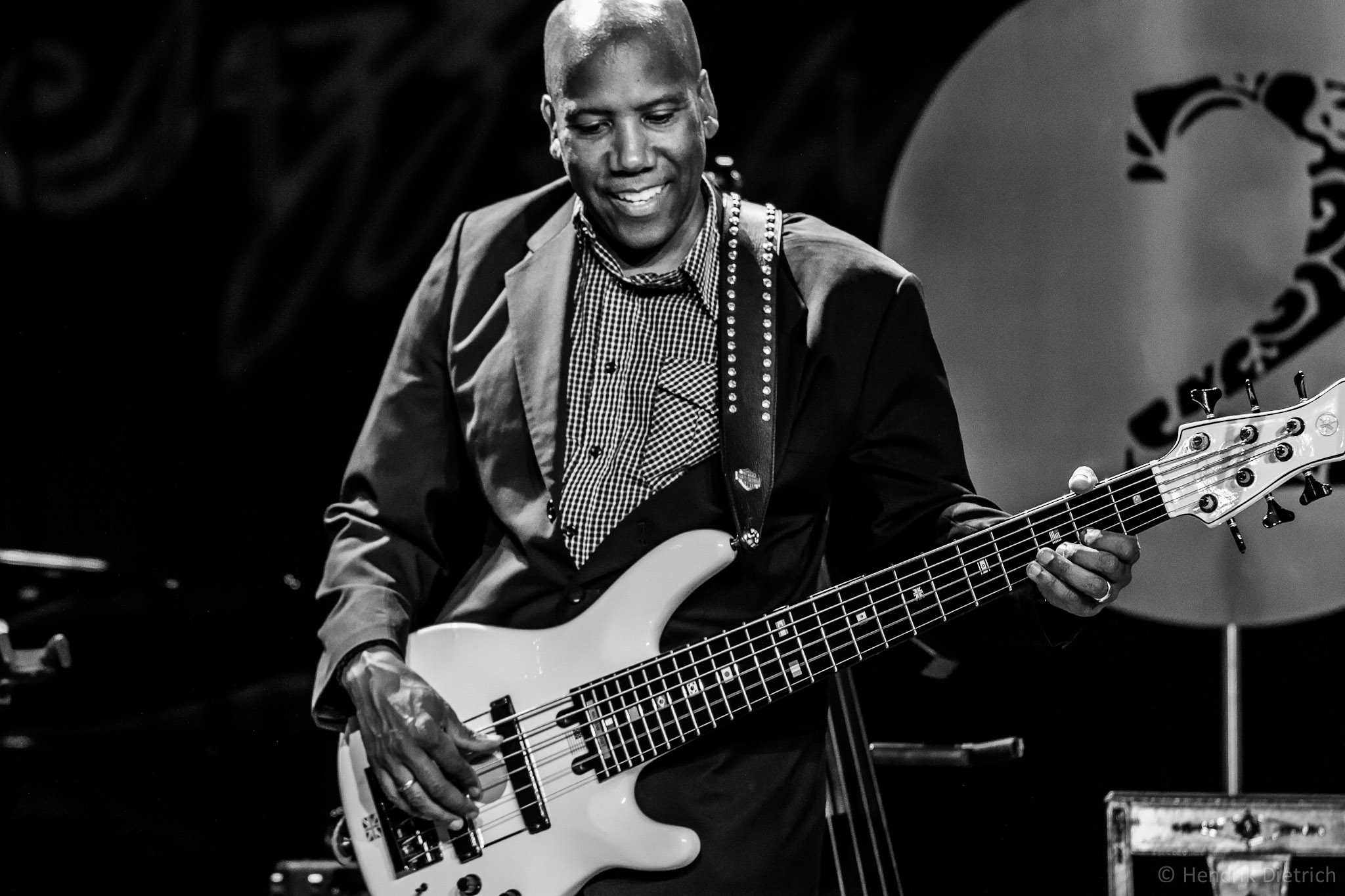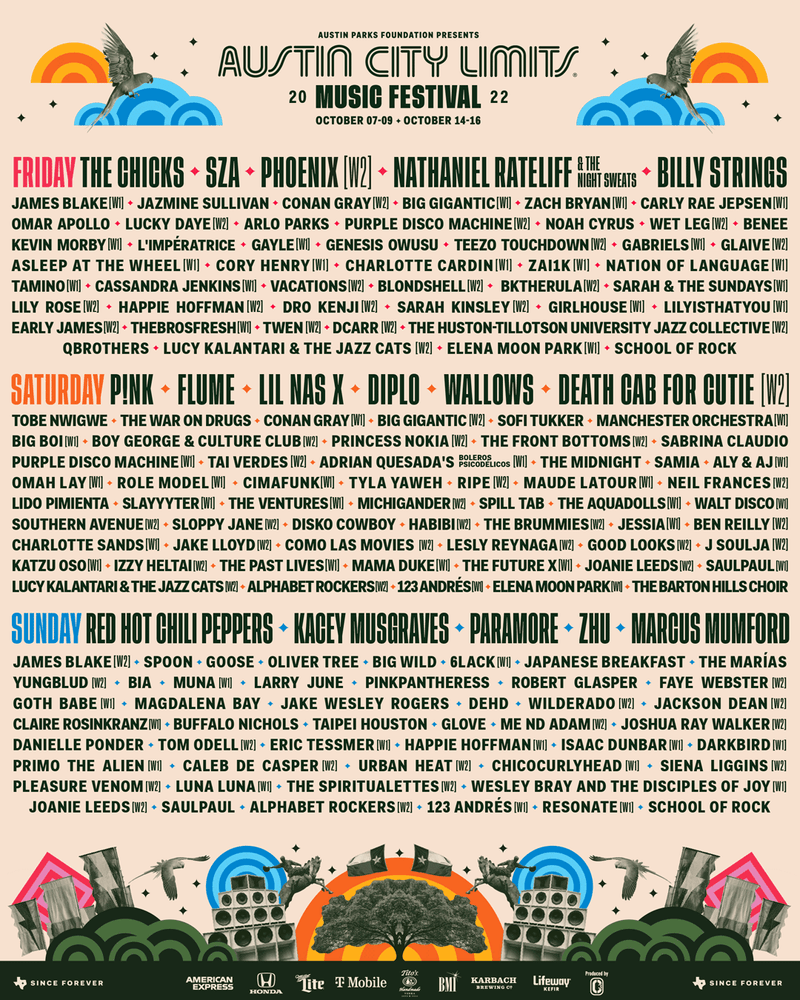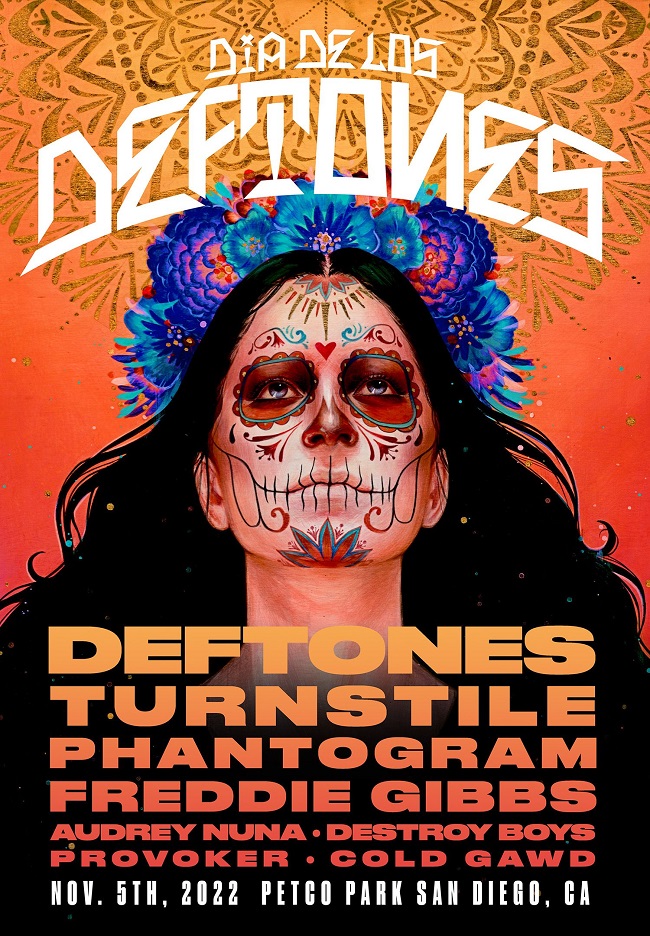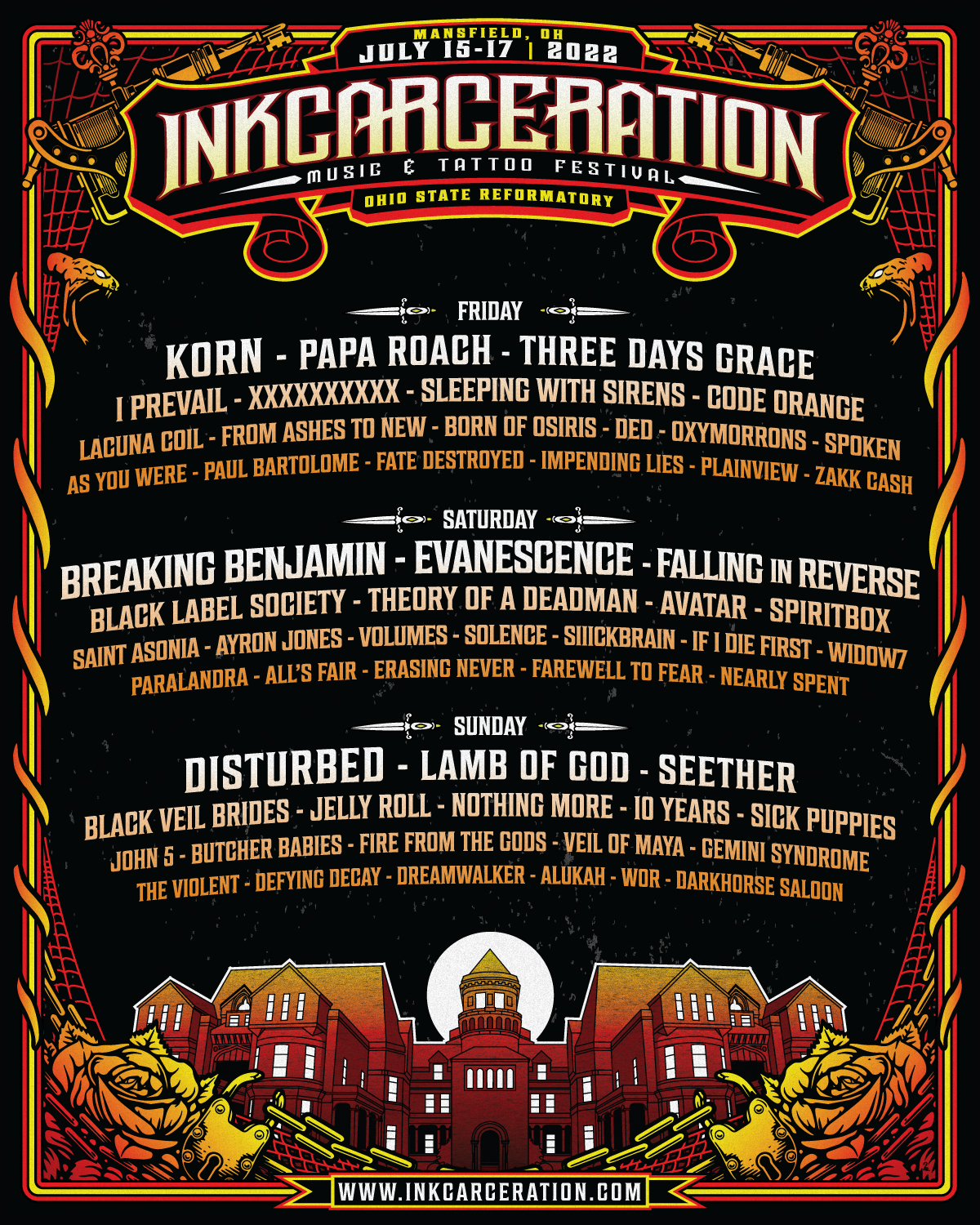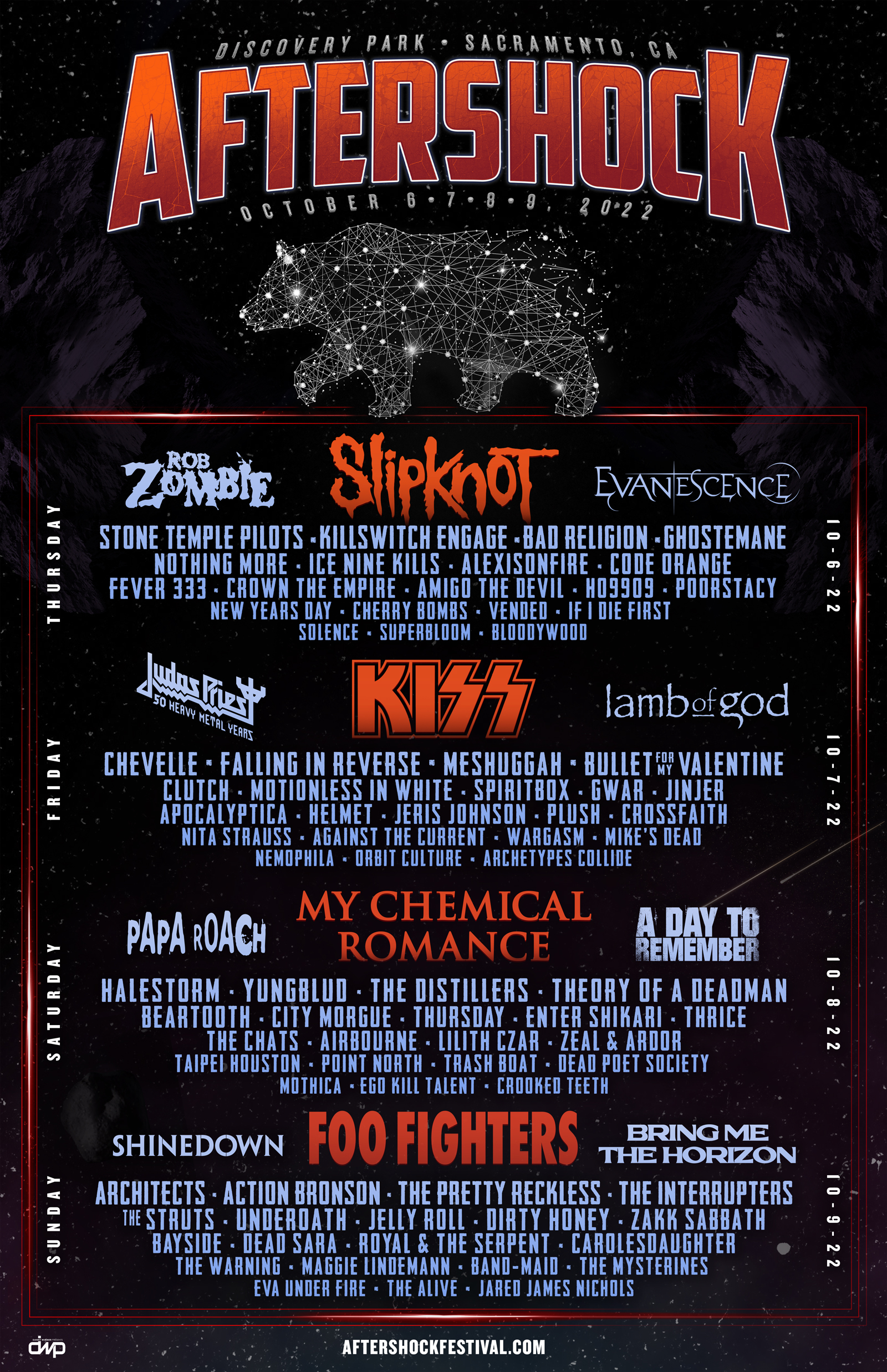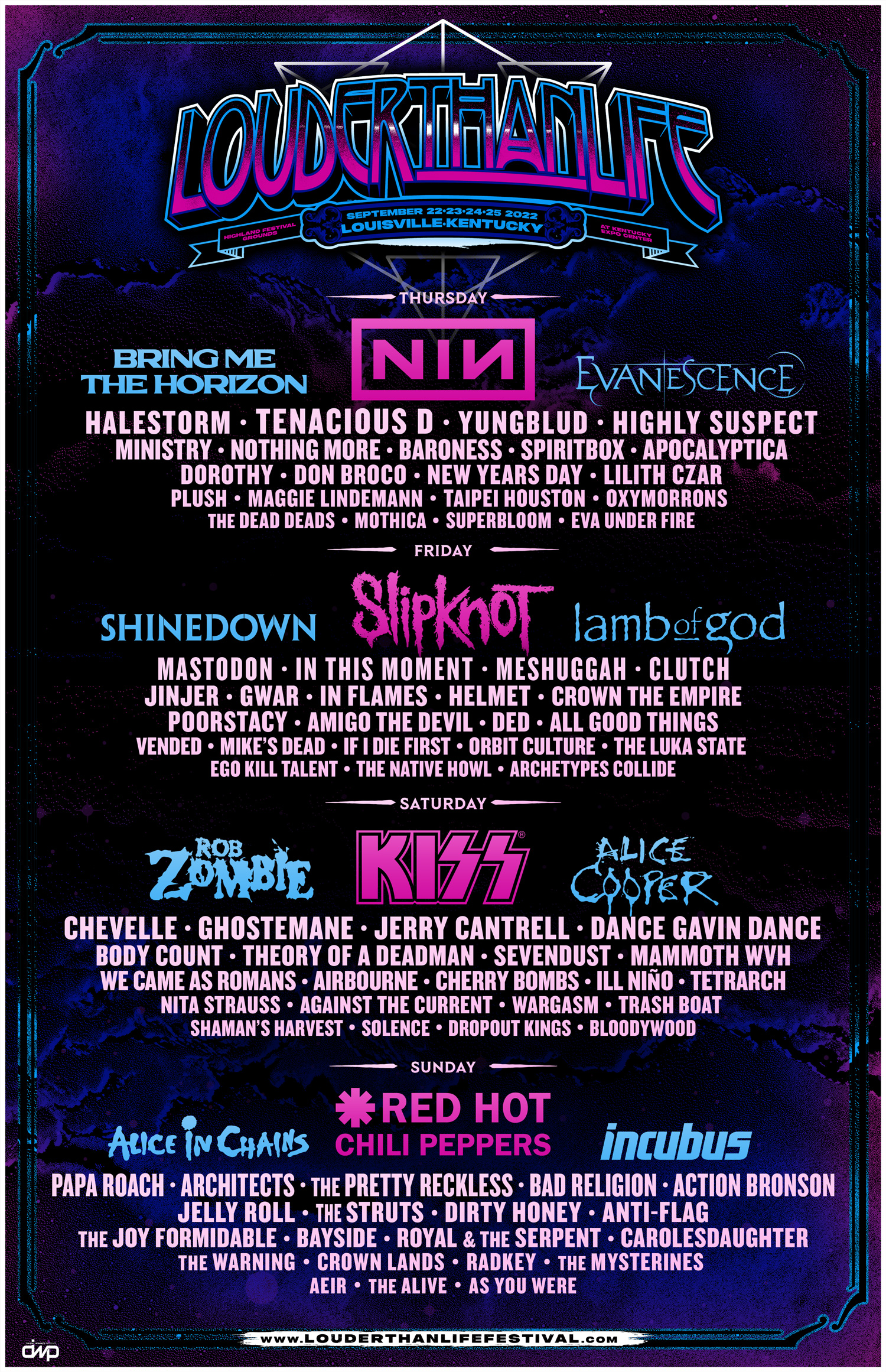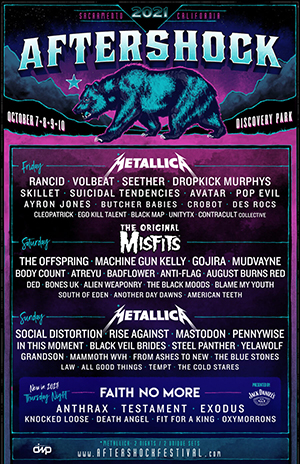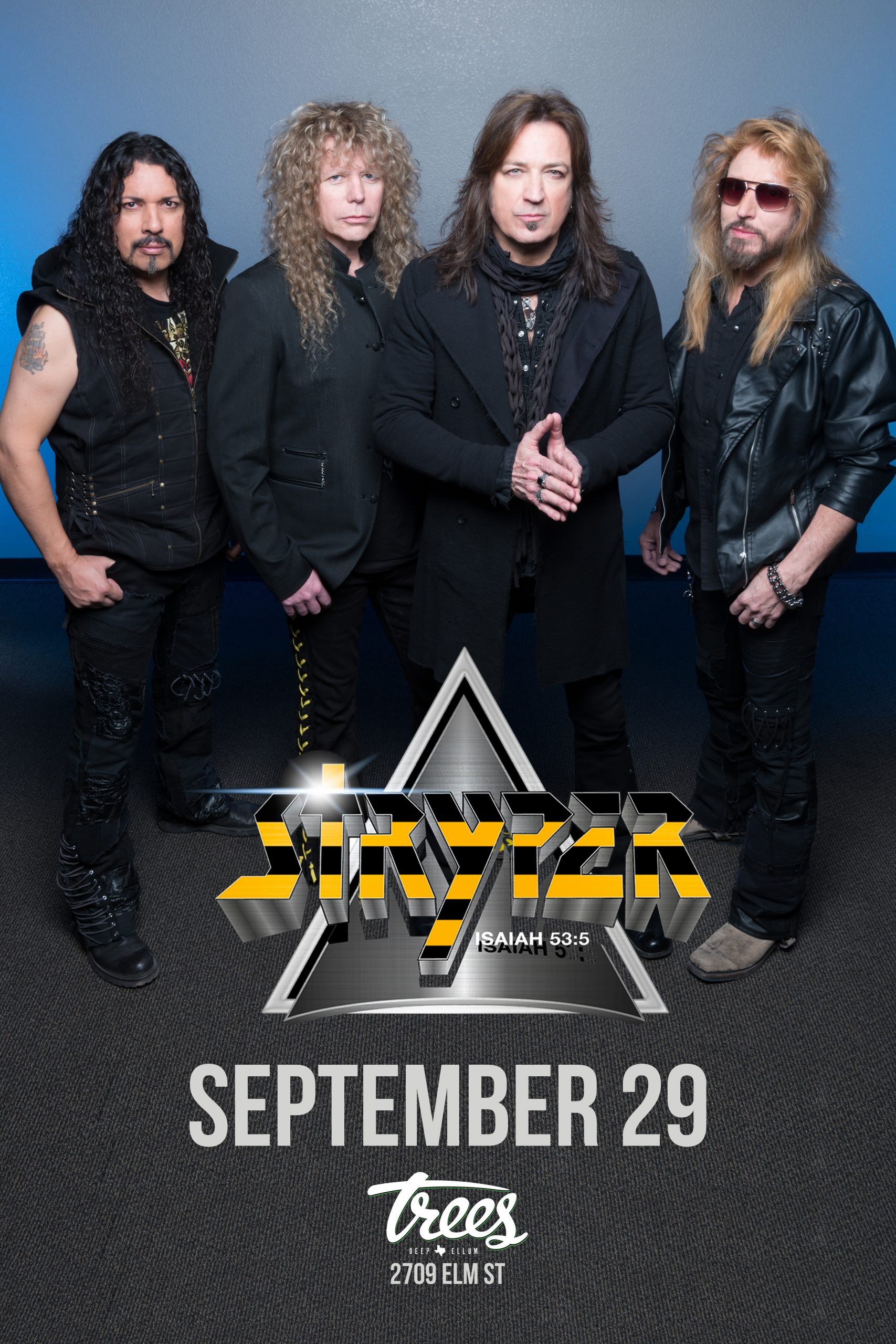An Exclusive Interview with Bassist, Solo Artist Nathan East
– Interview by On Tour Monthly // Photo by Hendrik Dietrich –
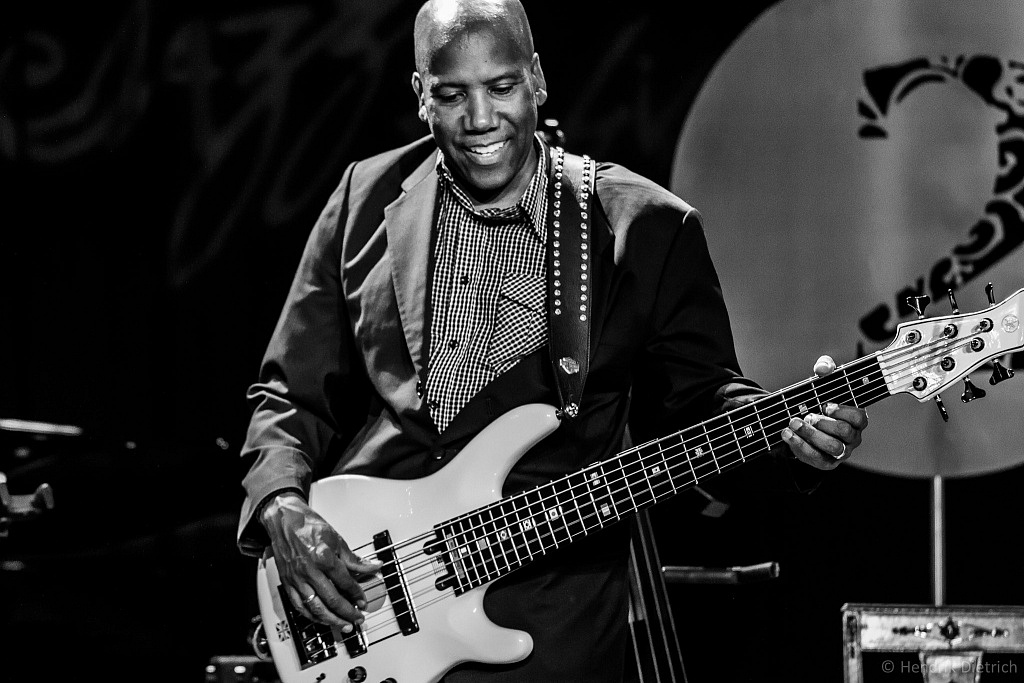
Nathan East is one of those musicians who can walk through throngs of people unnoticed in a sold-out arena, then go backstage and warm up with the band before silently slipping onto the stage to assume his post. Though his stealth approach works when he’s on tour with bands like Toto and Eric Clapton, there’s a special project near and dear to his heart the bass player wants the world to know about – his first solo record
On March 25, 2014, East’s self-titled debut record will hit the streets and the Internet. Though it’s a solid bet that at one point in your life you’ve heard Nathan East perform on a record, you just didn’t know it. With his contemporary jazz album containing original songs mixed with a treasure trove of classic cuts, the artist, not musician, has come out of the shadows to let everyone know he’s more than just a hired gun on sessions, or a touring musician.
As a founding member of the groundbreaking jazz quartet Fourplay, East solidified his status as one of the world’s greatest bass players. His session work is just as impressive. Last year he contributed the bass lines to the biggest record of 2013, “Get Lucky” by Daft Punk. He’s done his fair share of composing as well, with his biggest accomplishment being the Grammy nominated “Easy Lover”, the 1985 duet he wrote with Philip Bailey and Phil Collins. But past accomplishments with the Who’s Who of the music industry are just footnotes in the Nathan East timeline.
It’s the now East is concerned with, and it revolves around a labor of love that finally came together after years of talking about it. The album contains contributions from Michael McDonald, Eric Clapton, Sara Bareilles, Stevie Wonder, Toto’s David Paich, Ray Parker Jr and Nathan’s brothers-in arms with Fourplay, Chuck Loeb and Bob James. To make it a true family affair, his brother Marcel helps his younger sibling reprise “101 Southbound” they wrote 22 years ago for Fourplay’s platinum award winning disc. And then there is his 13-year old son Noah who contributes piano to the Beatles’ classic, “Yesterday.”
Over the past 40 years, East will tell you he has been blessed by his mastery over a piece of wood with four strings. It has enabled him to make a wonderful life for himself and his family. Now he finally gives some of that magic back in what one reviewer says is real music with no preservatives, no additives and no artificial ingredients. It certainly sounds like something you want to sink your teeth in to.
ON TOUR MONTHLY: Nathan, there’s a strong rumor circulating around the industry that after some 35 years of touring the globe with the biggest acts in the world, and that’s not including the great jazz emsemble Fourplay you’re a member of, you are actually putting out a solo record. Could you put those rumors to rest now?
Nathan East – I can’t believe it myself to tell you the truth.
OTM: So the rumors are true?
You know what? I can say with certainty that on March 25, 2014, my solo record is coming out.
OTM: Is it jazz, is it rock? Is the album colored with sound from all the genres of music you’ve been associated with over the years?
It is a celebration of my musical life over the last 30 years with elements from various genres. If you had to label it I’m not sure what category it would fall in, but probably closer to jazz.
OTM: So how many years did it take for you to final lay down all the tracks – ten, fifteen?
Oh man, it has been twenty years since I was talking about it and fiddling around in the studio playing with ideas. We actually went into the studio July 9, 2013 for the first day of recording with a rhythm section. Prior to that we spent a few months on preproduction and arrangements for the music we were going to record.
OTM: You are friends with more many musical luminaries in this business than you can count. How did you go about selecting the right person to participate on the various songs you recorded for your album?
That is an excellent question. As a matter of fact, for everyone who is on the record, there are two or three people that are going to be mad at me. Initially, we were going to track every day for seven or eight days. I then asked myself who would be the main rhythm section. My first choices were Jeffrey Babco on keyboards; Michael Thompson on guitar, the late Ricky Lawson on drums, which I’m still recovering from, Rafael Padilla on percussion and Tim Carmon on Hammond B3. That was the core unit. Then my musical brothers would come in, like David Paitch from Toto. He would drop by and ended up being the third keyboard player. Ray Parker called and said he wanted to be part of the record, so he was on some things. It kind of took off from there.
OTM: The enormity of this project overwhelms me when I read about the musicians involved. How did it make you feel performing music with all this incredible talent at your disposal and you only are going to keep 13 tracks?
Well, what we did was cut 26 songs altogether. Then the problem became which songs are we going to record for the album. Literally, I wanted to put 20 songs on this record. We ended up with 13 and I am really proud of everything. The album has a cohesive feel running through it from the first song to the last. It was all cut live with new school and old school musical approaches I’m hoping everyone will love.
OTM: I have been an observer of the music industry since I did my first rock interviews in college back in 1979. Ironically, David Paitch was one of the first. The Internet and technological advances springing from it that have taken over the business the past ten years, has literally blown my mind.. Now I’m on the outside looking in. You’re on the inside looking out. Did you have any anxieties releasing this album considering the ‘state of the union’ so to speak?
You are absolutely right! It is a new world out there for recording artists. Controlling your intellectual property is the biggest problem you have to deal with. At the same time, you have to put those thoughts behind you. There’s only one way to do it and that’s to create a package of music you hope people would want to purchase.
OTM: Did you approach this project as more of a labor of love instead of something to make money off of?
Absolutely I did. Before the last ten years changed the business model for the music industry, acts went on tour to support a record release. Now you make a CD to support a tour. It has completely flipped. I realized the window was closing on me in regards to making a solo record. In a few years, I’m sure the CD will go the way of the cassette or 8-track tape – it will just disappear. Automobile manufacturers have stopped making CD players and new models now come with a USB port and satellite radio. I figured I had better get in there now with my record before the window closed. As far as I’m concerned, the timing for this couldn’t be better.
OTM: I know you are really into photography. Did you shoot any of the images accompanying your disc?
No, I had somebody come in and shoot. But you are right, I really am into photography, the latest equipment, you name it. We even documented the entire process which I’m thankful we did now with Ricky Lawson’s passing. We have a lot off footage of him performing and speaking on tape, which I will treasure. We will end up making a documentary when it’s all over.
OTM: Today’s technology makes it extremely easy to create permanent reminders of your accomplishments. With a click of a mouse, millions of people will be able to tune in and see what Nathan East’s solo album is all about.
We live in a new world, and if you accept it, then everything finds its own level. You know, a blacksmith can’t yell at every car that goes past him because it is ruining his business. We are in the digital age now, and if you can’t beat them, join ‘em. I am very happy with the package and the way it turned out.
OTM: I’m going on my fourth decade of covering the music industry and interviewing artists, and the one thing I’ve come to realize is this. Great guitarists are idolized, great singers are romanticized, great drummers are held in awe, but bass players, you’re going to have to help me here Nathan, I can’t find an adjective to describe them.
(Laughter) As far as the bass goes, and this is how I approach my playing, you feel the bass player rather than notice who is playing the instrument. I’m happy with that. The bass player is the glue that keeps everything together, but the focus and attention is always on the lead guitar player. The funny thing is, the horn players are the ones that walk away with all the girls. As a bass player, I’m happy to lie in the middle of the foundation of what’s going on around me. If I do my job right, then you don’t even notice what I’m doing. When I made this record, there’s a similar sentiment where I’m not trying to say, “Hey everybody look at this cool stuff I can do with my instrument.” I just wanted to make and celebrate music with other musicians I’ve had relationships with over the years.
OTM: You are like a bartender in a club. No one quite knows who you are. The thing is, you are an integral part of the overall operation because you have to adjust your style to cater to the particular needs of the clients you are serving.
That’s a pretty good analogy. It’s funny, but I do feel like a bartender at times because of the roles I’ve played. There are also times I’ve felt like a therapist, or psychiatrist, dealing with a roomful of people and handling the energies each one possesses. The bass player is like a traffic director keeping the vibes together. I really like the vantage point from the bass chair and the fact the attention isn’t always on you.
OTM: How do you determine which songs to record with the Nathan East stamp on it?
That’s another great question you’ve asked. Instinctively for years, I’ve had ideas about what I want to record. For instance, I used to sing “Can’t Fine My Way Home” with the Clapton band. I’ve sung that as a lead in concert halls and arenas around the world. That’s a song I felt I wanted to record on this CD, and I did. I was recently in Norway, and there was a big band playing in the hotel where we were staying for a wedding. I walked into the ballroom and they were performing “Sir Duke.” The bass player recognized me and just handed me his bass. The next thing I know I’m playing “Sir Duke” with this eight-piece orchestra. People were dancing and singing and it was a feel good vibe. Just from that moment there, I realized the song was a universal feel good tune. That’s how two of the songs made the final cut, and the rest of the music just fell into place from there. I also did a solo bass version of “America the Beautiful” which was inspired by Jaco Pastorius version. We then added strings and made it a much bigger production. So, it’s just ideas that develop over time until you have a package that is balanced with flavor, feel and love – all the things people gravitate toward in music.
OTM: Is it dangerous for you to cover “Can’t Find My Way Back Home” because I envision, the world envisions, hearing the falsetto voice of Steve Winwood singing the verses to this classic song, not Nathan East.
Obviously you want the original guy, and the creator of the song, to be happy with what you have done. One of the moments in my life that I won’t ever forget is the night I sang that song at the Royal Albert Hall in London with Clapton. After the show I went backstage and there was Steve Winwood. He said, “The song sounded great. I love what you did with it.” I told him it was a good thing I didn’t know he was in the audience or I would have been nervous singing his song. But it made me feel good having his blessing with the version I sang. But you are absolutely right about nailing the song. It is nerve racking covering someone else’s music. When you commit to doing it, you really want to present something you are really proud of.
OTM: When you join an established act as a touring musician, are you careful how you interpret the bass lines of the original artist who created the music, or does it make any difference to you at all?
For me, I like to honor the original part. When you are playing the same song every night, sometimes you ask yourself what you would have done had you recorded it or what would you do to improve certain parts. I start making little upgrades. What I eventually I have done with the song sort of finds its own space over a period of time.
OTM: Because you made a big name for yourself in the jazz world with Foreplay, does it give you the freedom, or the liberty, to tinker with established music especially if you are rerecording someone else’s bass lines without offending the original musician who invented that sound in the music?
To me, all music is hybrid. If I am playing an R&B song and I drop some rock into the tune, or if I am in a rock and roll situation and I can cleverly insert a passing chord or a pattern change drawn from my jazz background, I think it carves out a little new territory fusing the genres together somewhat. I happen to be one of those people who feel there’s good music and bad. I am very fortunate that I have been involved in a lot of good music throughout my career. The thing is, the music wasn’t genre based, I just came to the table with some good instincts and playing what you know is right for the song.
OTM: A lot of musicians strive for perfection, and you may never be like your hero James Jamerson, but the journey to get there is the interesting part as to who you eventually become.
Thirty years ago, I could always hear what I would have done differently to a song I was working on as a session player. At the same time, in that striving for perfection, I also realized I had to do what was best for the song. Every day that I go to work, I try to do that. It doesn’t matter if I’m working on an unknown artist’s project or if I’m working with Eric Clapton or Daft Punk. I go to work every day with the same work ethic. I want my performance to be great. I want to do what I can for the song so it serves the needs of the artist I’m recording with, not my own personal taste. That is my approach to playing the bass when it comes to session work and even touring. For me, playing the bass is a constant work in progress.
OTM: How long have you been married?
I am closing in on the 20 year mark.
OTM: I ask that because a musician’s lifestyle isn’t an easy one, and to find someone who understands the business and the bizarre hours you keep is truly remarkable. Your wife is undoubtedly your greatest hit.
Oh there is no doubt I got lucky on that end. I am blessed. I’ve known my wife since college. That’s where we met. It’s like hitting the lottery if you find the right person, and I most certainly did. Obviously when I roll in at two in the morning after rehearsals, it’s not the same as a guy coming home at five o’clock every day from work and saying, “Honey, what’s for dinner?” With this life there is travel, there is sacrifice, there are long hours. The bottom line is this. When my wife and I are together and away from the business, the two of us spend quality time together and appreciate every single moment we have. The life of a musician is so completely different, to share it with someone who appreciates the fact you don’t have a nine to five existence is a true a blessing.
OTM: When you were selecting or composing the 13 songs on your solo album, did you have to take on a completely different persona on each tune you performed?
It was similar to when I’m fresh off a Clapton tour and I’m shifting gears to perform jazz with Foreplay. Then I can leave that and perform with Herbie Hancock. For me, it is about playing good music. In making the record, I would go in focusing on the one track we had selected, and deciding how it would sound. Maybe it would have a little Brazilian feel in the front then break into a funk. Actually, I specifically chose the musicians I went into the studio with because of their experience making records for other artists over the years. These guys had an arsenal of experience to draw from. These players were the same musicians David Foster, or Babyface, calls in for session work on the artists they are working with. Their presence gave the sound of my album a cohesive feel. No one had to explain anything to them about the songs. Everyone had great instincts and ran with them. It didn’t matter which road the song went down, these guys knew what to do when they went down the path and made the transitions seamlessly.
OTM: What is it about the manipulation of sound that fascinates people? Let’s face it, your ability to perform with four strings and a piece of wood has enabled you to enjoy a pretty good life.
You’re right about that. The vibrations that the instruments give off are the magical things about music. It’s an element you can’t quite put your finger on and analyze. You can’t say this particular sound is the way it is done, or this tone will make people fall in love, or recall fond memories. Seriously, I can’t give you an accurate diagnosis of why sound has such a profound effect on people. You can manipulate a chord by speeding it up or slowing it down. You can change a key to a lower register and it completely changes the context of the music. You can drop sound one beat per minute and it changes the entire feel of a composition. For musicians, they know if a session they’ve been in was pure magic. The vibe you have captured is something that is unbelievable to experience. That is the essence why people started recording music in the first place. For example, when Wes Montgomery’s talent with the guitar was discovered, it was so far beyond anything anyone had ever heard, people wanted to capture those moments and preserve them for future generations to hear. That rule still applies today. If you come in and have enough mastery over an instrument that is special from everybody else who performs with it, that’s what the recording process is warranted for. It’s better than pressing a button on a machine to reproduce the sound.
OTM: You literally had the “A-Team” working with you in the studio. What was that like?
When you don’t have to explain what you’re doing to musicians, just kind of give them a course to follow, you create a collective sphere of music that can take you down remarkable roads. The guys I chose brought a lot of instinct, knowledge, expertise and wisdom to the table. That focused went into each and every song, and whenever I heard an “Oh wow, let’s hear that back!” then it was mission accomplished.
OTM: I would have thought having too much talent in one room would create more problems than it would solve. Then again, your work with Foreplay, where each musician was a monster talent in their own right, actually prepared you to work under extraordinary circumstances.
I have been blessed over the years because I constantly get to work with the greatest musicians on the planet. Foreplay was one of those situations. I get to work with musicians I respect and the bonus was the fact I was a big fan of their work before I ever met them. That said, my work with those guys did help prepare me in terms of me knowing what could be accomplished when you have great players in the same room. Now it doesn’t necessarily guarantee anything as far as music is concerned. It’s the chemistry everyone creates playing together that’s the key to success or failure. Quincy Jones knew how to bring out the best in sessions players better than anyone I’ve ever met. He knew how to mix all the right ingredients together in order to get the sound he was looking for in the songs he was writing and producing. It’s like you are always going to school and learning how the big boys do it. It’s up to you how you apply the knowledge for your own use.
OTM: When you were preparing to record individual tracks, did you have to put any type of charts on the wall to keep track of everything? I would have thought certain musicians would bring their own style to the table for everyone to adjust to depending on the song you were recording.
We did have charts, boards, musician’s names, parts to overdub, etc. In fact, we had this album pretty strategically mapped out so that we could keep everything organized. After a while, you have files everywhere, hard drives with songs on them, there’s a lot to keep track of when creating music.
OTM: What characteristics did a song have to possess in order for you to be interested in recording it?
I discussed a lot of it with my co-producer, Chris Gero at the Yamaha Entertainment Group. Chris produces a lot of the shows that I am the musical director for. We have worked together for many years in that capacity and know each other very well. He had a good awareness for song selection, which tracks would work in a balanced tempo. He’s the one that threw out the idea of recording “A Letter From Home” by Pat Metheny. That’s one of my favorite songs, and when Chris mentioned it, I knew we were thinking on the same track. This album was basically songs I wanted to talk about, write about, sing about and play about. It was one day at a time, one song at a time. You put one step forward and the next thing you know you have an album.
OTM: Is the bass going to be the predominant instrument I hear on your release?
The bass is not the main instrument. It’s just one of many. We have a full orchestra on some of the tracks. There are horns giving off the big band sound where Tom Scott arranged them on a couple of the songs. For me, I approached this album the same way I do session work. Sara Bareillies came in and sang this beautiful ballad written by Michael McDonald that is basically just piano and voice. The bass comes in and adds this big warmth to the bottom, and there are strings on the top. It’s a simple, yet beautiful production of Michael’s song.
OTM: How did you know which guest vocalist would be right one for a song you chose for them to sing on the album?
Well, it’s not easy. You have a vision for who would be a great vocalist on a song, but there are so many great singers out there, it’s tough to sort out. I think one of the first people to say yes before we even figured out which songs to record was Michael McDonald. He’s one of my favorite singers of all time. I knew that if I was going to make a record with voices added, I had to have Michael sing a song. He showed up and did great.
OTM: Seriously Nathan, in today’s world, I don’t know if you could have started out as a jazz player like you did 25, 30 years ago. The business is moving too fast today. No one takes the time to slow down and listen. If the music doesn’t move people immediately, they move on to something else. It’s not a friendly world out there and unfortunately, great music is falling through the cracks.
I know exactly what you are saying. I often feel like starting today with what I know, how easy would it be to get started. When I came to Los Angeles, there were hundreds of studios with hundreds of sessions going on at any minute within miles of each other. Now, there are just a few studios and it is sad for the guy aspiring to do what I did 35 years ago. They don’t have the opportunity I had. It depends upon the genius of the person as to how they are going to make it through, like cream rising to the top. It’s a new day out there, a different age. We are living in a microwave mentality where if it isn’t cooked in 30 seconds, you’re done – next!
OTM: Living in Texas the past 30 years, the guitar is God in this state. If you make a name for yourself with the instrument, it carries weight around the country, the world even. But bass players are like an afterthought, and I don’t mean that in a disparaging way, but despite the fact you are the glue that holds the song together, you are basically ignored. If you asked me to name three great bass players, I would say Geddy Lee, Sting and Paul McCartney, then I am stumped.
Listen, I understand exactly what you are saying. Those three you mentioned were not only in some of the biggest bands the world has ever seen they were the lead singers as well. The bass player normally doesn’t take on that role. The bass player is usually the guy in the background trying not to play too much and stay out of the way. My mission and challenge as a musician was to not be too boring, too flashy, and just level out the song. That’s kind of the way I have lived my life, just have a balance with everything I do. I approach music the same way. If I’m working on a track that needs a little something here or there, I will keep it nice and simple. That approach works for me. It has allowed me to have the most fun, the most exciting times all because I’ve learned to master this little piece of wood that has four strings tied to it that puts out a vibration. My instrument has blessed me with a life where I’m living the dream.
OTM: Have you ever turned down a gig because you just didn’t agree with the music you were being asked to perform, or you didn’t like the person you were working with?
Not for those reasons, but one time I was called in to replace the legendary James Jamerson on a track. I got to the studio and they said “We don’t like this part.” I said I couldn’t do it because the ‘guy’ who played this part, in my mind, is the most legendary bass player that ever lived. Everything I know about the instrument, all those Motown songs I learned from that he played on – I’m not going to do it. That was the one time I wouldn’t do it. Normally, I don’t mind and it doesn’t bother me because I’m in and out of the studio. I don’t have to go to lunch with them, so I don’t mind. But that was the only time I told a producer they had to get someone else to replace my hero.
OTM: Is there a genre of music you don’t want to deal with, like rap or electronic dance music? Are there some frontiers in music you just don’t want to bother with?
You know what, if there is, I haven’t found it yet, because I love everything. When I got the call last year to play on the Daft Punk record, “Get Lucky”, there’s your electronic song and they wanted a real bass sound on the track. They told me to come in and bring it and I did. Little did I know that the “Get Lucky” project would blow up like it did and become a worldwide hit! I really am a music lover and I can’t think of any genre that I wouldn’t go in and play. I listen to everything, and if I don’t know how to play something, then I like the challenge of learning.

